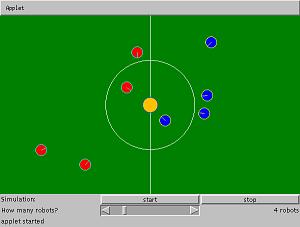Soccerbots and the goals of open-source software

|
TeamBots(courtesy of Tucker Balch) |
November 27, 2001 Why is open-source code (Linux, Apache, MySQL, PostgreSQL, Zope) so adept at filling market segments missed by titans like Microsoft, SAP and Oracle? How can a rag-tag army of uncompensated minute-men so consistently beat the well-financed Red-coats?
This may be the key question in computing (and, by extension, the building of most new social institutions) in the coming decade.
Explanations -- altruism, lower-prices, no risk of vendor failure -- abound. Here's an idea to add to the mix. A computerised soccer game described in today's New York Times offers a nice metaphor for Open Source's dynamics and dynamism.
Working in a lab in Atlanta, Georgia, Tucker Balch has programmed computers to play a rudimentary game of soccer. The software is called TeamBots.
...the robots learn to play soccer by executing a random sequence of basic moves — running toward the ball, kicking it, moving behind the ball, blocking it. For every sequence, a computer program either rewards or punishes the robot with a digital signal telling it whether the sequence made sense and whether it should be repeated.
The "players" develop different models of behavior (and success)depending on whether they are rewarded individually or as a team.
Under the first scheme, a reward signal is sent only to robots that score a goal. As the match progresses, every team member ends up learning the same sequence of behaviors — going after the ball in a solo effort to score. As a result, the circles on the screen bunch around a single point — wherever the ball is — leaving the rest of the field open to attack.
Under the group-based reward scheme, all members in the learning team receive a reward whenever any of them scores a goal. After several learning loops, some of the robots ended up with behavioral sequences that made them good defenders. Others in the team evolved into forwards. "Group rewarding produced greater diversity," Dr. Balch said, "and that made the team a winning combination."
The New York Times notes that the soccerbots "behavior" may shed light on the behavior of individual humans; should everyone in a company get the same pay, wonders one commentator?
But it is also interesting to think about the soccerbots as stand-ins for larger economic players, i.e. companies.
In this recasting of the story, the Microsofts of the world all scramble after the ball, while the companies and individuals that build open source code avoid ball-hogging and collaborate. They disperse across the economic land-scape, specialize and benefit from the work of their differentiated peers.
And, like the soccerbots, "all members in the team receive a reward whenever any of them scores a goal" because OS products (and team members) become more powerful and pervasive. The leveragable network grows, which benefits all.
While we're on the subject of metaphors about self-organizing systems, I enjoyed this review of Steven Johnson's latest book Emergence: The Connected Lives of Ants, Brains, Cities, and Software.
The book explores the way disorganized individuals (like slime mold, sparrows, heart cells, and computer codelets) can, without premeditation or outside intervention, cohere into sentient-acting organizations. Under the right conditions, slime molds swarm, birds flock, heart cells beat in sync, and code can create winning soccer strategies.
By cohering, the individuals achieve mutual benefit, or what business school gurus call the Network Effect.
Which brings us back to the Open Source movement: can these individual corporate players evolve into a larger organization whose shape exceeds the abilities and expectations of any of the discreet players?
Yes and no. Economic competition will undoubtedly drive companies to evolve new forms of cooperation and interaction. But even when steered by human self-consciousness, evolution can take a LONG time.
Final note: Whenever possible, Pressflex uses and supports Open Source software including Linux, Apache, PHP, Zope, PostgreSQL, Webalyzer, and MySQL. And the software for soccerbots is essentially open source.
Henry Copeland from Paris, France


